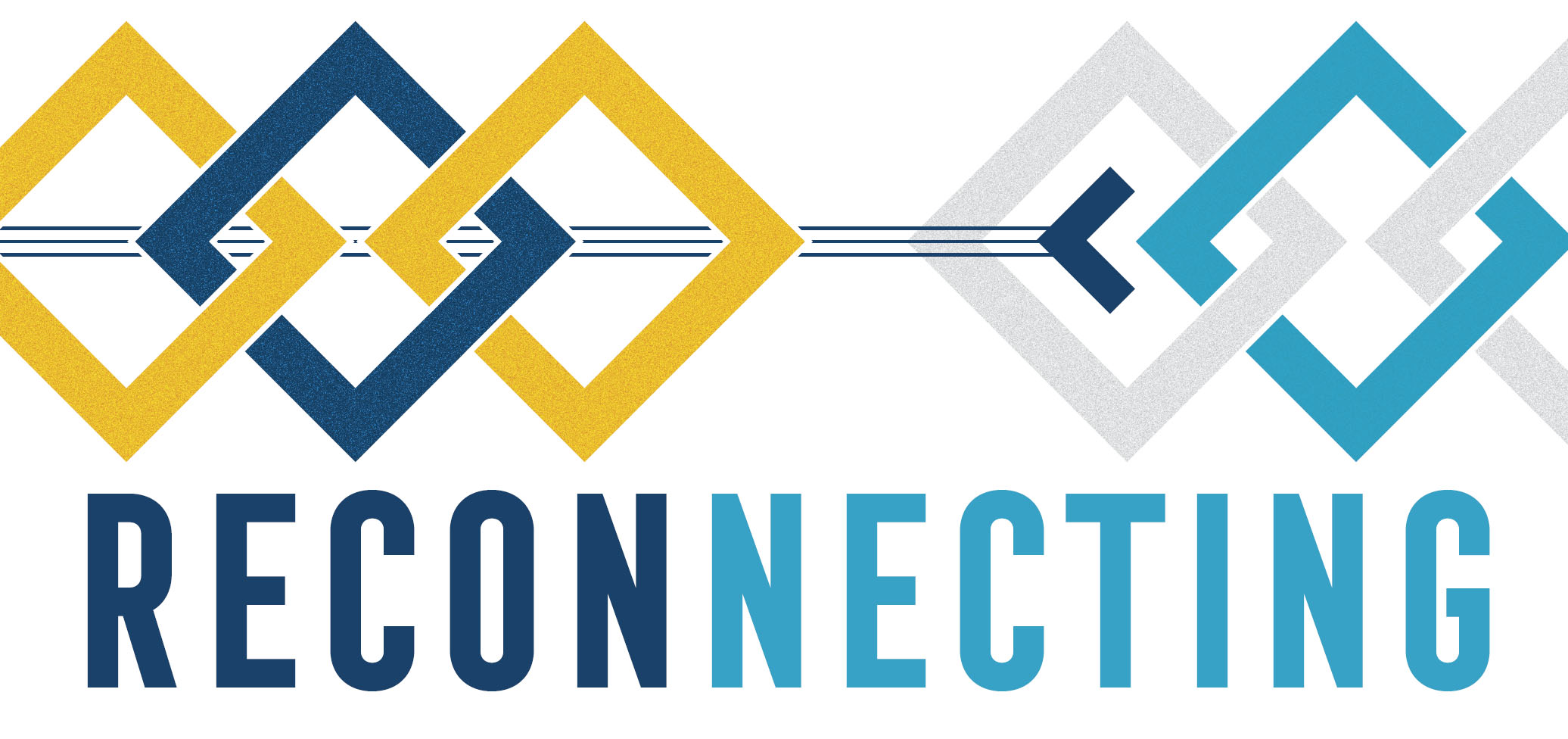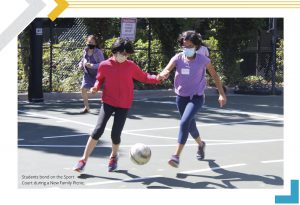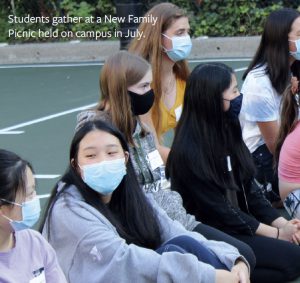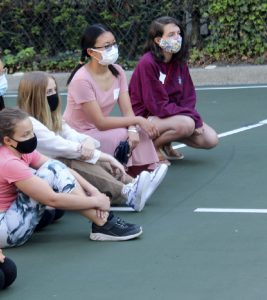
Throughout our remote and hybrid learning experience of 2020 and 2021, teachers and students made concerted and sometimes Herculean efforts to stay connected with the school and each other. As important, effective, and meaningful as those endeavors were, we still had a lot of work ahead of us to reconnect as we began planning for the 2021-2022 school year. Below are outlines of efforts (some still in the planning phase as of this writing and so subject to change as conditions fluctuate) to make sure connections are made and grown for EPS students, employees, and parents.
Upper School
By Dr. John Stegeman, Head of Upper School
Roughly one-third of the ninth and tenth grade classes had only been to campus a handful of times, and many students knew their teachers and classmates only by interacting through a screen. In the spring and summer, plans were laid to emphasize reconnection in the upcoming school year. Here are three significant ways we have jump-started connection as we returned to campus full time in fall 2021.
Fall Orientation and Overnight Trips
Few schools place such an emphasis on community and relationship-building that they start each year by dedicating the first week of classes to this work. At EPS, Fall Orientation has students spend two full days outside of the classroom (and largely outside the curriculum) with their Advisors and classmates. This allows students to reconnect with friends not seen over the summer, meet and get to know new students and teachers, and share experiences that build class identity and a sense of belonging.
Community Building in Advisory
The Upper School Advisory Program is designed around three foundational pillars: academic advising, social-emotional learning and well-being, and community building. As educators of adolescents, we know that for students to reach their potential academically, they need to feel seen, heard, and valued enough that they become willing to take intellectual risks in the classroom. In order to create this important safety net and sense of belonging, this year we emphasized community building in the first Advisory activities of the year. Most Fall Orientation experiences included some Advisory group activities, which served as a springboard for subsequent
lessons and activities over the following weeks.
Student Leadership and Cross-Grade Mentoring
Our students themselves have also conceived or contributed to several additional projects aimed at connecting students to the school and one another. Last year the Student Leadership Council (SLC – EPS’s student government) created new Grade Level Representative positions, which proved to be quite effective in disseminating and gathering information related to SLC initiatives, and also provided more leadership opportunities across the student body. In addition, two new or expanded cross-grade mentoring initiatives are underway: student-led study groups, and an expansion of the Peer Mentoring program that will include mentoring within the Upper School, in addition to the work that Peer Mentors have traditionally done with Middle School students.
Middle School
By Sam Uzwack, Associate Head of School for Middle School and Student Support Services
 This fall more than half of the Middle School will not have spent significant, if any, time on campus. And while our focus every year is welcoming new fifth and sixth graders to EPS and helping them to learn the values of the place, this fall will require even more intentionality for all of our grades. This will require a careful balance of direct instruction and experiential learning. Most students learn about the ethos of the school by living it…not hearing about it. It is the collective day-to-day experience that shapes our students’ belief in the vision and mission of EPS. At the same time, it is important to equip students with a framework to understand their experience, as well as make every effort to surface the “unwritten rules” of our school culture.
This fall more than half of the Middle School will not have spent significant, if any, time on campus. And while our focus every year is welcoming new fifth and sixth graders to EPS and helping them to learn the values of the place, this fall will require even more intentionality for all of our grades. This will require a careful balance of direct instruction and experiential learning. Most students learn about the ethos of the school by living it…not hearing about it. It is the collective day-to-day experience that shapes our students’ belief in the vision and mission of EPS. At the same time, it is important to equip students with a framework to understand their experience, as well as make every effort to surface the “unwritten rules” of our school culture.
As in the Upper School, our Fall Orientations are a key aspect of creating community, but the efforts cannot stop there. By building on the experiences students have during Back-to-School picnics and Fall Orientations in Advisory, in the classroom, on the stage, and on the field, we will all work together to focus on the most important aspect of our community: relationships. Advisory programming will put a premium on social-emotional skills such as selfawareness and identity development, with the understanding that all of our students will be on their own journey of a “return to normal.”
IT IS OFTEN SAID THAT IT TAKES FOLKS NEW TO A SCHOOL AN ENTIRE YEAR TO LEARN THE PLACE…THE EBB AND FLOW OF THE CALENDAR, THE KEY EVENTS AND CELEBRATIONS, AND OF COURSE, THE PEOPLE.
-SAM UZWACK
It is often said that it takes folks new to a school an entire year to learn the place…the ebb and flow of the calendar, the key events and celebrations, and of course, the people. We will need to remind ourselves again and again that we are all still working together to be the community we want to be as we embark on school year 2021-2022.
EPS Professional Community (Faculty and Staff)
By Matt Delaney, Director of Academic Design & Integration
Below are a number of the mechanisms we will use this year to ensure that EPS faculty and staff reconnect, and that new employees connect to colleagues for the first time.
Breakfast, Lunch, and Student Activities
One of our most valuable spaces for connection and collaboration is the Levinger-Poole Commons. The fabric of our professional community is strengthened as we eat and exchange ideas with each other and students. Many of the school’s innovations and integrations have emerged over a shared meal in the Commons. Additionally, student projects, productions, and games are great ways for us to get to know our students both inside and outside of the classroom.
Opening Meetings
New faculty and staff participate in a one-day orientation and are joined the following day by all faculty and staff for six more days of preparation before Advisor Conferences. This mix of work and re-connection time has been invaluable to our professional community in the past, and is even more important as we seek to reconnect and/or make new connections as colleagues post-quarantine.
Onboarding Program | Mentor-Mentee Program
Starting with their date of hire, each new EPS employee is connected to resources to help them transition into and attach to our professional community. This includes access to digital resources and systems, as well as new colleagues in their academic discipline groups or school offices.
Each new EPS faculty member is connected to a mentor in their academic discipline. New staff members are connected with a mentor outside of their school office to foster more professional connections. While new faculty and staff had mentors at distance during the 2020-2021 school year, they will carry over their connection to their mentors as we return to campus. Faculty and staff new to EPS in 2021-2022 are also connected to mentors for this year.
AM Meetings
One of the biggest gains of EPSRemote was the ability to have consistent morning meetings for the EPS faculty and staff. These meetings, which continue in the 2021-2022 school year, include:
- Full Faculty-Staff
- MS | US Divisions
- Grade-Level Coordinators and Teams
- Academic Design Group
- Academic Discipline Groups
- Faculty-Staff Equity, Inclusion, and Compassionate Leadership Group
- Tech and Divisional Office Hours
Professional Development Project (PDP)
This program started in 2019-2020 school year with five faculty participants working with colleagues on teams to successfully complete a portfolio. Considering the demands of remote teaching and learning during quarantine, this project was paused for the 2020-2021 school year, and returns with six new faculty participants this coming year. The connections made on these teams are incredibly healthy for our professional community and ecosystem.
Parent/Guardian Community
By Vickie Baldwin, Director of Institutional Advancement
 Eastside Prep is a place for students to learn, grow, and find their place. It’s more than that though—it’s an opportunity for our parents and guardians to create community connections as well. We know those connections are important—they help create a sense of belonging for the entire family, create opportunities to hear more about their student’s social and academic life at EPS, and create a support structure centered around shared experiences. With a year of mostly online opportunities behind us, we’re looking forward to more in-person experiences in the coming year. We have renewed our efforts to foster parent/guardian connections through events—some that are new and some that previously existed. Below are just some of those efforts. Some are school-sponsored, while many are led by our Parent Association under the leadership of PA President Katharine Pike and our Hospitality Committee—Bengu Bostanci, Cindy Goetzmann, Shairose Gulamani, and Xixi Shakes.
Eastside Prep is a place for students to learn, grow, and find their place. It’s more than that though—it’s an opportunity for our parents and guardians to create community connections as well. We know those connections are important—they help create a sense of belonging for the entire family, create opportunities to hear more about their student’s social and academic life at EPS, and create a support structure centered around shared experiences. With a year of mostly online opportunities behind us, we’re looking forward to more in-person experiences in the coming year. We have renewed our efforts to foster parent/guardian connections through events—some that are new and some that previously existed. Below are just some of those efforts. Some are school-sponsored, while many are led by our Parent Association under the leadership of PA President Katharine Pike and our Hospitality Committee—Bengu Bostanci, Cindy Goetzmann, Shairose Gulamani, and Xixi Shakes.
Ambassador Phone Calls
Each new family received a phone call from one of our Parent Association volunteers sometime between mid-June and mid-July. These conversations help create connections between parents as well as providing answers to questions about day-to-day student life at EPS.
New Family Picnics (July)
New Family Picnics in July were initiated just two years ago to help families who are new to EPS connect with other new families and a smaller group of returning families. These were planned as smaller (and hopefully less intimidating) group opportunities that then progress to the full-grade picnics held just before the start of school. Some structured activities are included, along with social time. This past July, new families from both the 2020-2021 and 2021-2022 academic years were invited to picnics on campus.
Back-to-School Picnics
These traditional picnics, hosted by the PA Grade-Level Representatives, are for the entire class—students, siblings and parents/guardians. Picnics for the fifth- and sixth-grade families are held on campus to help them become familiar with the campus prior to starting school. Each picnic is designed to help students connect or re-connect with classmates and allow time for parents to get acquainted.
 PA-Sponsored Gatherings
PA-Sponsored Gatherings
Grade-Level Representatives of the Parent Association are asked to create opportunities for social gatherings for parents and guardians each year. After hosting those events mostly online last year, we learned that some parents are able to attend those virtual gatherings more easily. This year, PA Reps will be hosting some in-person and some online events in order to reach more parents and guardians.
School-Sponsored
Grade-Level Gatherings
Middle and Upper School grade-level gatherings are held during the school year and provide another opportunity for parents to connect with others in their student’s grade. While plans are still underway as of this writing, some virtual and in-person components are anticipated for these events.
Parent Association Meetings
After a year of holding PA meetings virtually, we learned that some parents who would not otherwise be able to attend our in-person meetings are able to do so when an online option is available. When we resume in-person meetings, we plan to provide remote options for all PA General Meetings in order to make those accessible to our entire parent/guardian community.
Parent Education
We’re thrilled that Dr. Kelly Moore will be returning to lead much of our Parent Education Program for the 2021-2022 academic year. These efforts are not only informational, but they also provide yet another opportunity for parents to connect in smaller group environments.
Events
In addition to grade-level-specific opportunities, we hold two all-school parent events each year—Fall Harvest and Winter Celebration. Fall Harvest (slated for October 2) brings parents and faculty together in a purely social environment with no agenda other than making more connections. Winter Celebration (planned for January 20) is another touchpoint that provides that same opportunity midway through the year when relationships are beginning to solidify.
We learned much in the past year about our own resilience and capacity to learn in difficult situations. We also learned the importance of community and connections and the significance of in-person interactions. The efforts outlined above will help us make new connections, reinforce existing relationships, and strengthen our community—all while creating more inclusive opportunities to come together.

